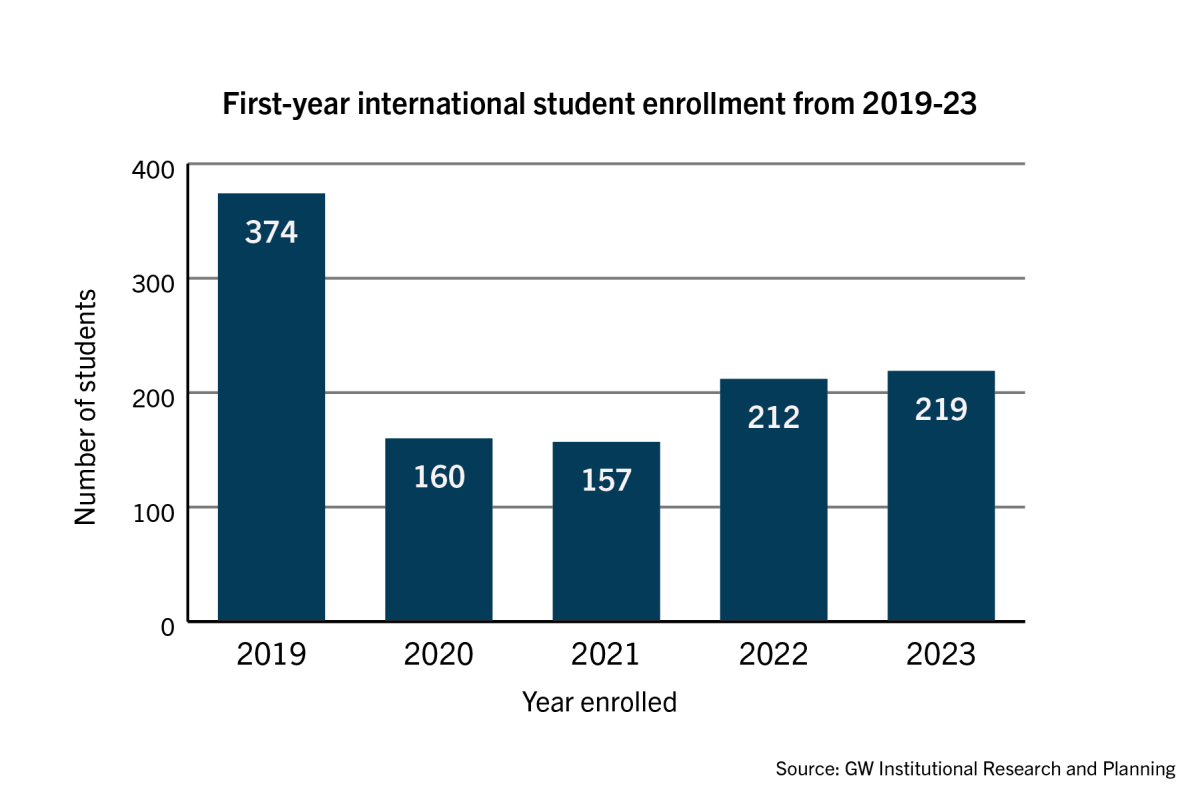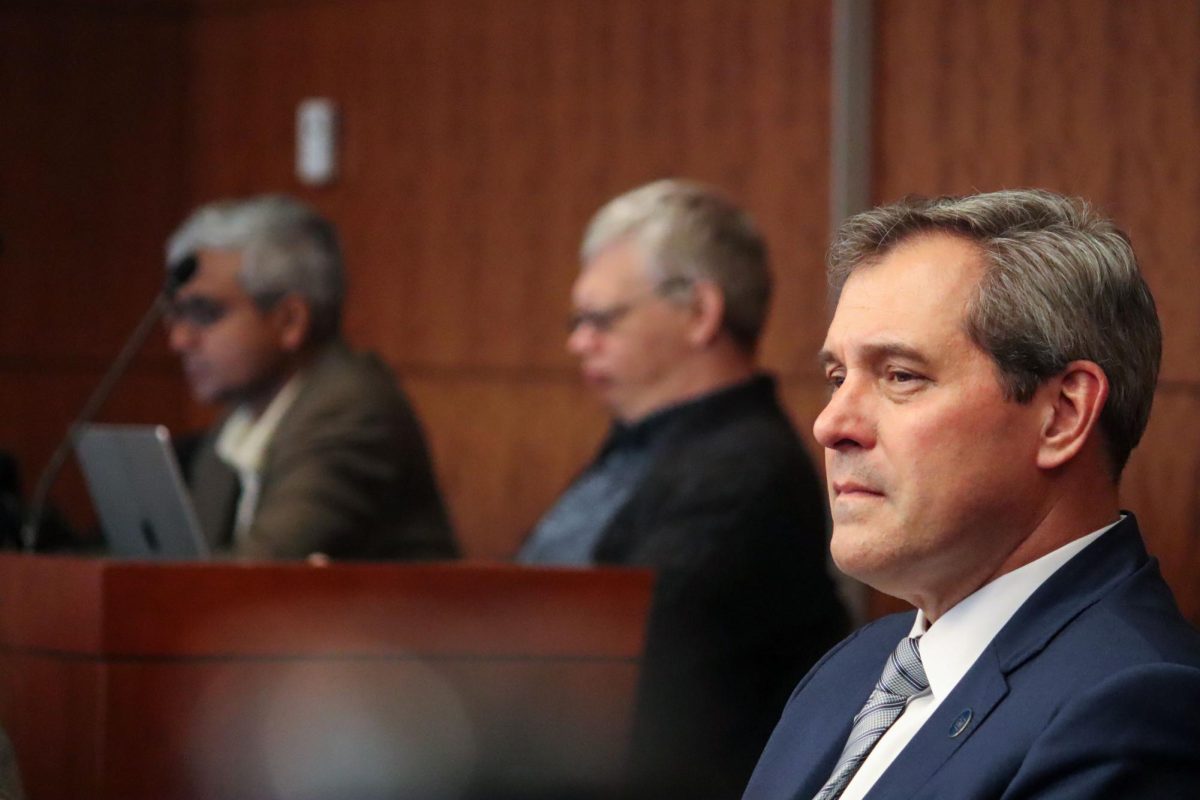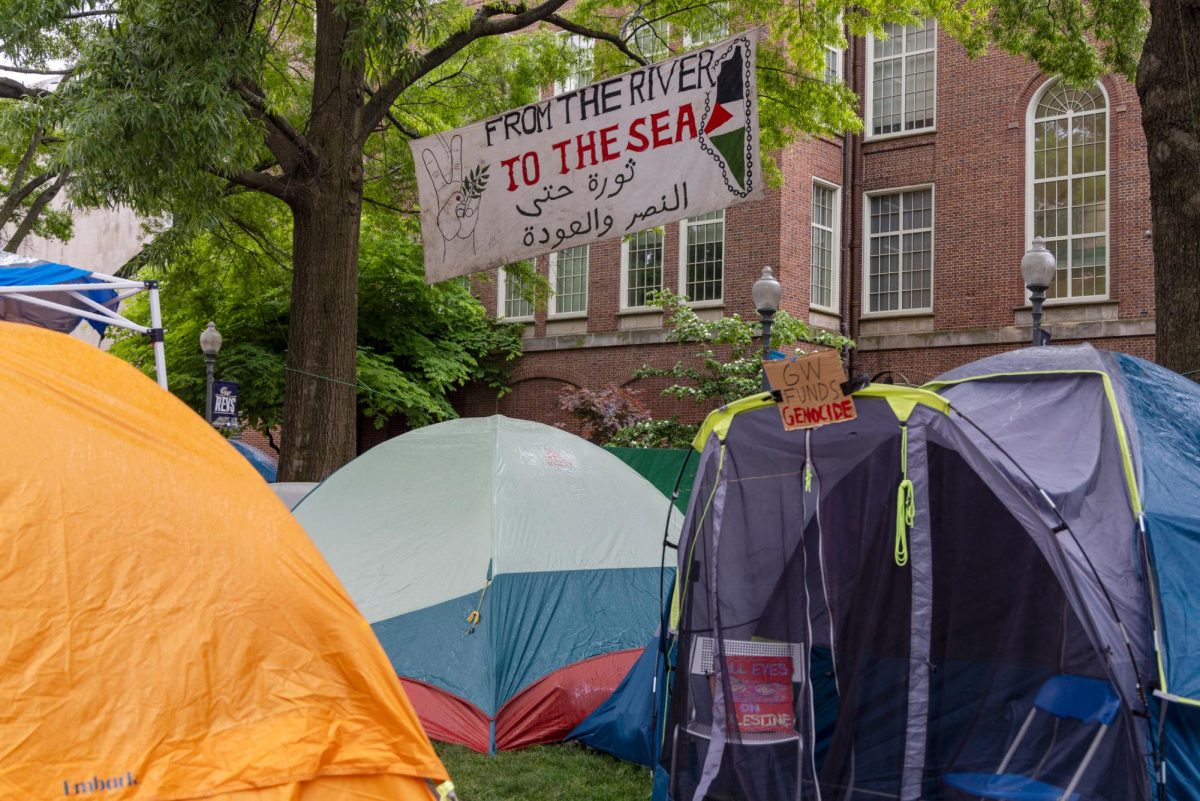Vice Provost for Enrollment and Student Success Jay Goff said at a Faculty Senate meeting Friday that the Class of 2026’s retention rate is one of the top four highest retention rates in University history.
Goff said GW retained 91.9 percent of the Class of 2026’s 2,985 first-year students during the annual enrollment update at the meeting. The first-year international student enrollment of 219 students this fall has surpassed the amount of first-year international students in fall 2020, 2021 and 2022 and is approaching pre-pandemic levels, according to his report.
“We believe this signifies that many of our new, post-pandemic global outreach efforts have been very positive and have made a very positive impact,” Goff said at the meeting.

Provost Chris Bracey said in April that officials prioritized recruiting students from a wide range of countries to achieve the three-year upswing in international student enrollment after dropping by 52.3 percent in 2020 when the pandemic paused overseas travel.
Goff said 706 Indian international students are enrolled at GW this fall, a 59 percent increase from last year’s total enrollment from India. He added that officials expected fewer international students from China to enroll, on par with national trends, and officials will work to provide more outreach to “student populations” from the country.
He said the fall 2023 first-year students are one of the most “academically talented and diverse” classes in University history — the result of new strategies to reach out to groups of students who have not considered GW in the past. The Class of 2027 has an average high school GPA of 3.72, a mean SAT composite score of 1412 and a mean ACT composite score of 32, all of which are higher than or equal to the first-year classes from 2019 through 2022, according to Goff’s report.
“Nontraditional” student enrollment has remained below pre-pandemic levels, especially for nursing, health care and civil service programs, Goff said.
“The various deans and their leadership teams are working to find innovative ways to improve the connections with the students and to adjust our offerings to better meet their needs,” Goff said at the meeting.

He said the six-year graduation rate for students who entered the University in 2016 reached an “institutional record” of 84.8 percent. Students in the 2016 first-year cohort all graduated at the same rate, regardless of their eligibility for Pell grants — a federal undergraduate award for students experiencing financial need — which officials said is the result of the summer recovery academy and “success” coaches for academically struggling students.
He added that officials piloted an app for students in the schools of Business and Engineering & Applied Sciences where students can map out a four-year course plan and answer questions about their goals to study abroad or complete an internship during their time at GW. He said department chairs and academic advisers will then assist the students to work with their course plan to ensure they can accomplish all of their desired tasks.
He said officials will implement the app for Elliott School of International Affairs and Milken Institute School of Public Health students in March and will launch it for Columbian College of Arts & Sciences students next academic year.
“The initial retention rate of the students who used the program last year looks very promising,” Goff said.
University President Ellen Granberg said officials presented quarter one data on the Medical Faculty Associates — a physicians group that teaches at the School of Medicine and Health Sciences and has amassed a nearly $200 million debt by fiscal year 2023 — to the MFA Board of Trustees last week. She said officials will present the data to GW’s Board of Trustees next and senators will receive an update at a future senate meeting.
Granberg said she, Bracey and Chief Financial Officer Bruno Fernandes are launching a $25 million endowment called the Innovation Fund for classroom innovations and research. Officials reaped the $25 million from the sale of a building and the Office of the Provost will be managing the fund, she said.
Granberg did not specify from which building sale proceeds the Innovation Fund will stem from. In July, the D.C. Department of General Service purchased The Aston, a former residence hall, for $27.5 million to turn it into a shelter for unhoused people. Officials also sold the One Washington Circle Hotel to a Florida-based real estate firm in June 2022.
“We have a lot more that we need to do to fund the academic enterprise,” Granberg said at the meeting. “But Chris and I both thought that at this particular point in time to have some funds, to do some new things, to try out some ideas, to experiment a little bit would be a very helpful thing.”
During the meeting, faculty also raised concerns about the University’s commitment to free speech and academic freedoms given “recent events” on campus.
Since the outbreak of the Israel-Hamas war Oct. 7, students have participated in sit-ins, protests and vigils on campus and in D.C. Granberg previously called anti-Israel and anti-GW messages that were projected onto Gelman Library antisemitic and a violation of GW policy after she received national and local pressure to condemn the students behind the projections.
Granberg said GW utilizes the Chicago Principles, which protects free speech and expression in the “broadest possible latitude” as long as it does not impede upon the University’s ability to function. She said she does not predict any radical changes to GW’s free speech and academic freedom policies, but officials are examining where policies might conflict with each other and therefore be subject to change.
Granberg added that the University may choose to add regulations in “some institutions,” like housing, in order to maintain “peace and quiet” and an “appropriate study environment.”
“You can have a very, very robust commitment to free speech, and there can be some areas where for specific reasons institutions will choose to say, ‘Okay, in this particular area where students need, for example, study and sleep,’” Granberg said. “There might be a little bit more regulation.”
Granberg declined to answer questions after the meeting and deferred to sending questions via email. In her email response, she said she’s discussed the war between Israel and Hamas with students, families, faculty, staff, alumni, donors and community members on “all sides” of the war and hopes to ensure the safety and support of all GW community members.
She said she has directed University leaders to increase security on campus as needed. Campus Living and Residential Education officials announced that they will increase security in residence halls in response to activism in the District, according to an email sent last week.
“We are continually updating and sharing our consolidated safety, security and well-being resources. Moving forward, our work must and will continue to go deeper,” Granberg said in an email.
Bracey also announced the release of an admissions policy guidance document that will provide “operational guidance” for GW’s commitment to creating a diverse and inclusive student body while complying with federal law after the Supreme Court struck down the consideration of race in college admissions in June.
The document states that GW will not consider race as a factor in admissions and will continue to collect provided race and ethnicity demographic data in admissions applications and in “request for information forms.” GW will follow the Department of Education’s guidance, which promotes increasing affordability, accounting for adversity during application review, growing the number of applications from underserved student populations and encouraging students to enroll through “promising” student support services.
Bracey also announced he had charged a committee of GWSB faculty, alumni, students and trustees to search for Dean Anuj Mehrotra’s replacement for when Mehrotra leaves the position in January. Officials have tasked the committee with developing a description of the role that will be approved by business school faculty before it is released by GW, Bracey said.
Bracey added that officials will announce an interim business school dean sometime after Thanksgiving, who will start in the role in January.
Grace Chinowsky, Fiona Riley, Maggie Rhoads, Trisha Brahmachari and Tyler Iglesias contributed reporting.





